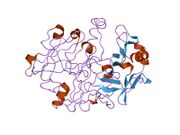Biology:Gastricsin
 Generic protein structure example |
Gastricsin also known as pepsinogen C is an enzyme that in humans is encoded by the PGC gene.[1][2][3][4]
Function
Gastricsin is an aspartic proteinase that belongs to the peptidase family A1. The encoded protein is a digestive enzyme that is produced in the stomach and constitutes a major component of the gastric mucosa. This protein is also secreted into the serum. This protein is synthesized as an inactive zymogen that includes a highly basic prosegment. This enzyme is converted into its active mature form at low pH by sequential cleavage of the prosegment that is carried out by the enzyme itself.[4]
Clinical significance
Polymorphisms in this gene are associated with susceptibility to gastric cancers. Serum levels of this enzyme are used as a biomarker for certain gastric diseases including Helicobacter pylori related gastritis.[4]
See also
References
- ↑ "Primary structure of human pepsinogen C gene". J. Biol. Chem. 263 (3): 1382–5. January 1988. PMID 3335549.
- ↑ "Human pepsinogen C (progastricsin) polymorphism: evidence for a single locus located at 6p21.1-pter". Genomics 4 (2): 137–48. February 1989. doi:10.1016/0888-7543(89)90292-9. PMID 2567697.
- ↑ "Human pepsinogen C (progastricsin). Isolation of cDNA clones, localization to chromosome 6, and sequence homology with pepsinogen A". J. Biol. Chem. 264 (1): 375–9. January 1989. PMID 2909526.
- ↑ 4.0 4.1 4.2 "Entrez Gene: PGC progastricsin (pepsinogen C)". https://www.ncbi.nlm.nih.gov/sites/entrez?Db=gene&Cmd=ShowDetailView&TermToSearch=5225.
Further reading
This article incorporates text from the United States National Library of Medicine, which is in the public domain.



